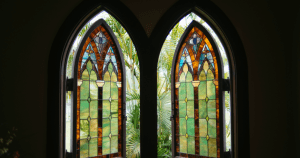 We enter this weekend into the 3d Sunday of Advent.
We enter this weekend into the 3d Sunday of Advent.
Good for John Dickson:
Well-known Australian writer, speaker, minister and apologist John Dickson has announced his decision to step down from local church ministry to focus more fully on reaching the “doubting public outside the church”.
Dickson has been in part-time church ministry for two decades, and Senior Minister of St Andrew’s Anglican Church in Roseville for the past nine years. He will retire from this position at the end of March 2019 to be a writer and speaker on a full-time basis.
Dickson, who describes himself as “a public advocate of the Christian faith”, has written 15 books, including the award-winning Simply Christianity: Beyond Religion. Two of his books – The Christ Files and Life of Jesus – were made into documentaries that aired on national television.
Sometimes we don’t know the whole story, and sometimes the real story is being hidden by authoritarian voices, three of whom are exposed here:
In spite of this, [John] MacArthur blamed secular forces and even Satan for the accreditation situation (in spite of the fact that TMUS was out of compliance on two key eligibility requirements — an independent board and a full time CFO). Much of the challenge came as a result of the significant overlap between the church MacArthur serves, the institution, and its governing structure. As I’ve written before, Christian universities aren’t churches and the more they confuse the two the more the latter takes precedence.
The Chronicle summary of the sermon ends with these warnings MacArthur gave to the community:
“I’m gonna be real honest with you,” he said. “You didn’t have any right to find out about anything. That’s not your responsibility.”
In his remarks he referred to a Bible passage from the Book of Proverbs.
“There are things that God hates, right?” MacArthur said. “One of them is the one who stirs up strife,” he said, urging students to keep their complaints within the university and seminary.
“Keep your mouth shut,” he said. “Don’t stir up strife. You don’t know the whole story.”
This combination of authoritarian leadership and dismissal of dissent is also at the heart of the sexual abuse stories arising out of the Independent Fundamental Baptist churches. The story is similar to what we’ve seen for years in the Roman Catholic Church — stories of abuse not being believed, perpetrators being transferred to new locations without disclosure, and placing the priority on the church’s mission and reputation. That the story opens with a review of the abuses by one of the key families in the movement only adds to the horror. This wasn’t some isolated pastor somewhere in a remote location. Key figures in the movement were engaged in abuse or involved in minimizing the impact.
When abuse was acknowledged, it was expected to stay in the church under the authority of the leadership.
“Any issues, even legal issues, go to the pastor first, not the police. Especially about another member of the church,” said Josh Elliott, a former member of Vineyard’s Oklahoma City church. “The person should go to the pastor, and the pastor will talk to the offender. You don’t report to police because the pastor is the ultimate authority, not the government.”
The insularity of a “we know best” philosophy becomes an impossible situation for those who have been victimized. It provides no place for them to remain within the fellowship in good faith. Either they will be seen as suspect or they have to live with a cognitive compartmentalization that is harmful to a healthy Christian life.
The subjects of the CBS program on #exvangelicals showed some of the same patterns. The churches they were part of provided little space for their questions or concerns. At first marginalized, they eventually leave the evangelical church because the pain of staying is too great. Even though they have left for their own well-being, they seem still to be processing considerable harm dealt them by the very group that was central to their upbringing.
Increasingly, “evangelical” means “white nationalist” or “white Republican”.
In short, this poll helps dramatize the trend among American evangelicals. Instead of the word “evangelical” meaning primarily a set of religious ideas and theological commitments, it has become a political and culture-war marker. If you call yourself an “evangelical” these days, it usually means you think of yourself as white, Christian, and politically conservative.
So it’s no surprise that big majorities of people who call themselves evangelical voted Republican. Choosing to call yourself an evangelical these days usually means endorsing a set of conservative political beliefs associated these days with the Republican Party.
What do evangelical Christians think about Trump and the GOP? This poll doesn’t tell us. To be an “evangelical Christian” can mean a whole bunch of different things. There are lots of non-white people who have religious beliefs that have historically been associated with evangelical Protestantism. There are white liberals who no longer call themselves evangelical but who retain their evangelical religious beliefs.
What this poll does tell us is that the word “evangelical” has come to imply a set of political beliefs, not only religious ones. People who embrace the label tend to embrace those politics. Are they still religious? Sure. But we make a mistake if we try to understand how someone with evangelical religious beliefs could support politicians who seem to go against those beliefs. Calling yourself “evangelical” these days is more about those political leanings than any specific religious commitments or theological ideas.
We don’t get political,” a friend recently told me about his church. It’s a sentiment many church leaders would appreciate: the implication that the church focuses on the truly important, spiritual things, instead of getting caught up in the quagmire of political debate. Regardless of the many arguments that could be made about the necessarily political character of the church or the need for churches to engage cultural issues, there’s one uncomfortable fact that trumps them all: our worship is political.
Whether we intend for it to be or not, the songs we sing, the words we repeat, the prayers we pray, the rhythm and rituals of our corporate identity shape our political identity. The real question is not whether our churches are political, but whether we’re aware of it. Are we thoughtfully considering the ways that our worship together can counteract the political messages of the world, or does our worship leave our political preferences undisturbed? Are our loyalties and allegiances formed more strongly toward the global church, our risen King, and his coming kingdom or toward a political party, a nation, or a racial category? One way to approach these questions is to discover the church traditions that have come before us, often rich with political significance, and join with centuries of Christians across the world in practicing them.
And in these seasons of Advent and Christmas especially, history points to a church whose worship is particularly political.
Worth reading the whole article, but here’s the ending:
After much debate, Virginia Mennonite Conference decided to ordain Ruth [Brunk Stolzfus] in 1989. She became the first women in the conference to be credentialed. However, George II [Brunk] communicated to conference leadership that, if they went forward with [his sister’s] Ruth’s ordination, he would withdraw his ministerial credentials and membership. When they did not change their decision, George II held to his commitment as well. When his sister entered the pulpit, he stepped down. Yet, though George II and Ruth never reconciled their different positions on women in ministry, they continued to relate amicably to each other for the rest of their lives.
Therein lies the biggest lesson that the Brunk siblings’ story and sermons teach us. Theological (or political) disagreements matter, but need not be toxic to relationships. There are stronger ties that bind us together. Despite not supporting her role as interim pastor at Bancroft, George II still came by Ruth’s house to help her pack her car. Ruth praised George II’s presence—in person and prayer—when her family faced a series of tragedies. And while even good sibling relationships are not perfect (just ask my sister), how George II and Ruth chose to relate to each other still proves instructive. As we spend this holiday season among family and friends with whom we might disagree, it’s helpful to remember that, though we maintain legitimate differences, there are things that matter more.
Church names, sorted by G. Shane Morris, with this conclusion:
Changing the name of your church to sound like a night club, a romance novel, or a spa probably isn’t worth the money you’ll pay your marketing consultant. You won’t appeal to a larger crowd, you won’t shake the negative perceptions many Americans have toward Christianity, and you might even come across as desperate (or worse) dishonest.
I’m not discouraging anyone from attending a church named “Relevant,” although I would suggest (as with all churches) that we keep both eyes on our Bibles. What I’m arguing is that churches should own their identity, no matter their denomination, creed, or confession.
If a congregation isn’t officially part of a denomination, what’s wrong with the older tradition of naming churches after apostles or other biblical heroes? Or why not “Emanuel,” “Redeemer,” or even “The Good Shepherd?” Wouldn’t that say more about a church’s beliefs than would a one-word name that sounds like a ride-sharing app? Why should we hide our theological convictions? They’re core to who we are. And they will remain long after fleeting fashions and edgy branding strategies fade.















